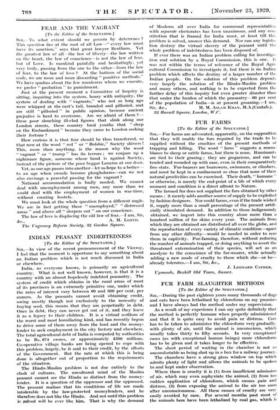-INDIAN PEASANT INDEBTEDNESS [To the Editor of the SPECTATOR.] SIR,—In
view of the recent pronouncement of the Viceroy, I feel that the moment is opportune to say something about an Indian problem which is not much discussed in India or elsewhere.
India, as everyone knows, is primarily an agricultural country. What is not well known, however, is that it is a country with an almost hopelessly indebted peasantry. The system of credit which obtains in the rural areas of most of its provinces is an extremely primitive one, under which the rates of interest vary between 60 and 300 per cent. per annum. As the peasants cannot avoid obtaining credit, owing mostly though not exclusively to the necessity of buying seed, this means that they are perpetually in debt. Once in debt, they can never get out of it, and they leave it as a legacy to their children. It is a virtual serfdom of the worst and most humiliating kind, and has recently begun to drive some of them away from the land and the money- lender to seek employment in the city factory and elsewhere. The total agricultural debt of India is computed by authorities to be Rs. 674 crores, or approximately £500 millions. Co-operative village banks are being opened to cope with this problem, largely, be it said to their credit, by the efforts of the Government._ But the rate at which this is being done is altogether out of proportion to the requirements of the situation.
The Hindu-Muslim problem is not due entirely to the clash of cultures. The uncultured mind of the Muslim peasant cannot see the Hindu as distinct from the money- lender. It is a question of the oppressor and the oppressed. The peasant realises that his conditions of life are made intolerable by the law-protected moneylenders, and he therefore does not like the Hindu. And not until this problem is solved will he ever like him. That is why the demand
of Moslems all over India for communal representation with separate electorates has been unanimous, and any con- stitution that is framed for India must, at least till thi, problem is solved, answer this demand. Nor can any legisla- tion destroy the virtual slavery of the peasant until the whole problem of indebtedness has been disposed of. If ever there was an Indian problem calling for investiga- tion and solution by a Royal Commission, this is one. It was not within the terms of reference of the Royal Agri- cultural Commission to investigate it, but there is no Indian problem which affects the destiny of a larger- number of the Indian people. On the solution of this problem depends very largely the solution of the Hindu-Muslim problem and many others, and nothing is to be expected from the further delay of this inquiry but even greater disaster than that under the burden of which the peasantry-90 per cent of the population of India—is at present groaning.-7-I






























































 Previous page
Previous page